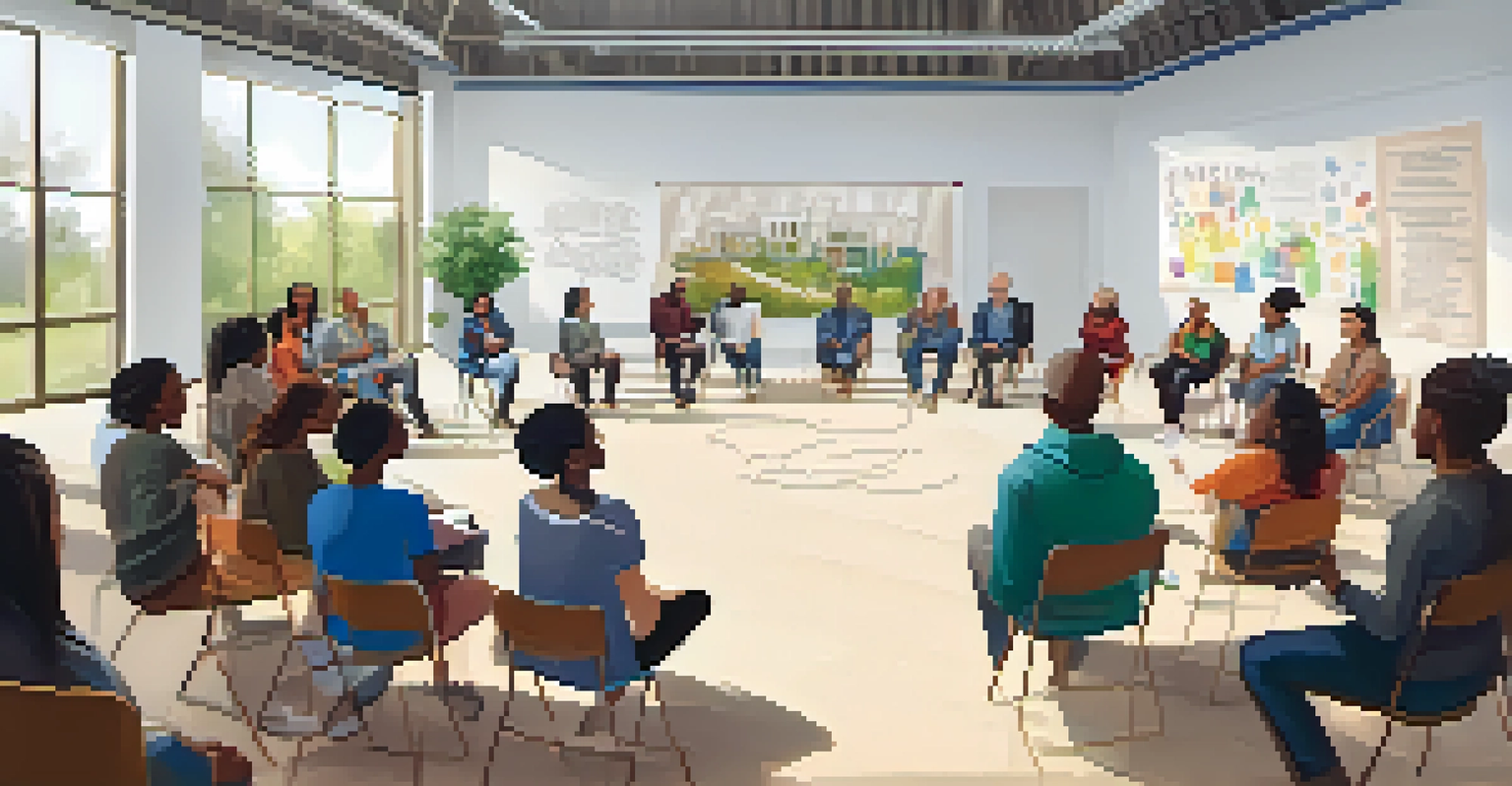Building Community Through Spiritual Conflict Resolution

Understanding Spiritual Conflict Resolution in Communities
Spiritual conflict resolution involves addressing disagreements through a spiritual lens, focusing on values and beliefs. It allows individuals to navigate their differences by fostering empathy and understanding. By prioritizing shared spiritual principles, communities can create an environment where conflicts are seen as opportunities for growth.
Peace cannot be kept by force; it can only be achieved by understanding.
For instance, consider a neighborhood facing disputes over community decisions. By engaging in spiritual conflict resolution, residents can express their differing views while holding onto their shared commitment to community well-being. This approach shifts the focus from winning an argument to finding common ground.
Ultimately, embracing spiritual conflict resolution can transform how communities handle disagreements, leading to more harmonious relationships and a deeper sense of belonging.
The Role of Empathy in Conflict Resolution
Empathy is at the heart of spiritual conflict resolution, as it allows individuals to understand each other's perspectives. When people actively listen and seek to comprehend the feelings behind a conflict, they create a space for meaningful dialogue. This empathetic approach can help diffuse tensions and pave the way for collaborative solutions.

Imagine two friends who have fallen out over a misunderstanding. By practicing empathy, they can step into each other's shoes, recognizing the emotions at play. This understanding not only resolves the immediate conflict but also strengthens their bond moving forward.
Empathy Enhances Conflict Resolution
Empathy fosters understanding and open dialogue, allowing individuals to navigate conflicts more effectively.
In community settings, fostering empathy can lead to a culture of support where individuals feel heard and valued. This collective sense of understanding enhances community ties and encourages cooperation.
Creating Safe Spaces for Dialogue
A safe space is crucial for effective conflict resolution, allowing individuals to express themselves without fear of judgment. When communities establish environments where everyone feels secure, open conversations can flourish. This is especially important when discussing sensitive spiritual or cultural issues.
In the middle of difficulty lies opportunity.
Consider a community workshop focused on discussing differing beliefs. By setting ground rules for respectful dialogue, participants can share their views freely, facilitating deeper understanding. These interactions help break down barriers and foster stronger connections.
Building safe spaces not only promotes conflict resolution but also encourages ongoing dialogue, allowing communities to navigate future challenges with greater ease.
Finding Common Ground Through Shared Values
Shared values serve as a foundation for building community and resolving conflicts. When individuals recognize their common beliefs, it becomes easier to address disagreements constructively. This sense of unity can motivate communities to work together toward collective goals.
For example, a community passionate about environmental issues may come together to resolve conflicts about land use. By focusing on their shared value of sustainability, they can negotiate solutions that respect both individual needs and the community’s ecological goals.
Safe Spaces Foster Open Dialogue
Creating safe spaces encourages honest conversations, which are essential for resolving sensitive issues within communities.
Ultimately, identifying and celebrating shared values can transform conflicts into collaborative efforts, enhancing the overall strength of the community.
The Importance of Active Listening
Active listening is a vital skill in spiritual conflict resolution, as it encourages participants to fully engage with each other's perspectives. This involves not just hearing words but also understanding the emotions and intentions behind them. By practicing active listening, individuals can foster a more profound connection, leading to fruitful discussions.
Imagine a team meeting where members are encouraged to share their thoughts without interruption. As each person listens intently, misunderstandings begin to fade, and empathy grows. This practice not only resolves conflicts but also enhances teamwork and collaboration.
In communities, promoting active listening can create a culture of respect where everyone feels valued. This environment can lead to more effective conflict resolution and stronger community bonds.
Incorporating Mediation Techniques
Mediation techniques can be incredibly effective in resolving conflicts within a community. By bringing in a neutral facilitator, parties can explore their differences in a structured environment. This process encourages open dialogue and helps individuals find mutually acceptable solutions.
For instance, in a community divided over a local project, a mediator can guide discussions, ensuring that all voices are heard. This approach not only addresses the conflict but also empowers participants to take ownership of the resolution process.
Shared Values Unite Communities
Identifying shared values helps individuals constructively address disagreements and work towards collective goals.
Incorporating mediation into community practices can lead to more peaceful resolutions and a sense of shared responsibility, strengthening community ties in the process.
Embracing Conflict as a Path to Growth
Conflicts, while often uncomfortable, can serve as catalysts for personal and communal growth. When approached with a spiritual mindset, these challenges can reveal deeper insights about ourselves and our relationships. Embracing conflict as a natural part of community life allows individuals to learn and evolve.
For example, a community that faces and resolves conflicts may develop stronger bonds and a deeper understanding of diverse perspectives. This process not only enhances individual resilience but also contributes to the community's overall strength.

By viewing conflict as an opportunity for growth rather than a setback, communities can foster a more adaptive and supportive environment, ultimately leading to richer connections.
Building a Lasting Community Through Conflict Resolution
The journey of building a community through spiritual conflict resolution is ongoing and requires commitment from all members. As individuals practice empathy, active listening, and mediation techniques, they contribute to a culture of understanding and respect. This collective effort can lead to a more cohesive community where everyone feels valued.
Consider a community that regularly engages in conflict resolution practices. Over time, members build trust and foster connections that withstand challenges. This enduring sense of community not only enhances individual well-being but also creates a supportive network for everyone involved.
In the end, nurturing a community through spiritual conflict resolution is about embracing diversity and fostering unity, ensuring that everyone can thrive together.